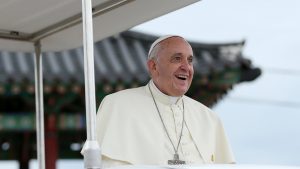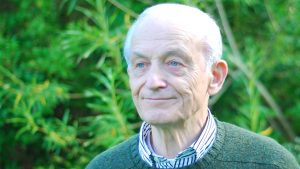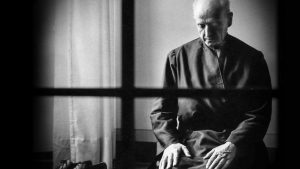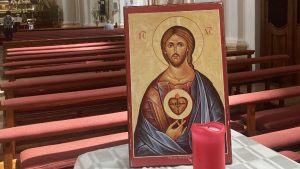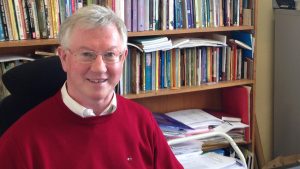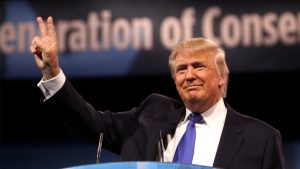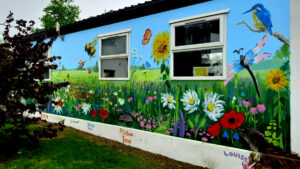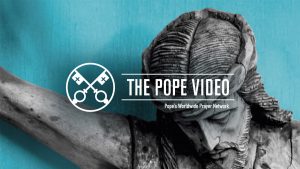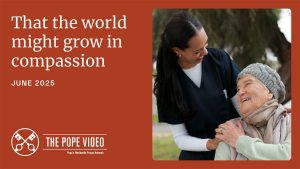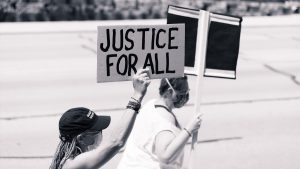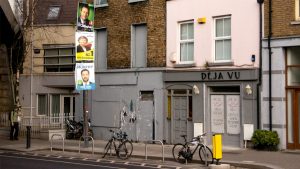John Bruton RIP: ‘An exceptionally good man’

John Bruton was ‘an exceptionally good man’, mourners were told by Fr Bruce Bradley SJ, speaking at the funeral of the former Fine Gael taoiseach. Bruton died on Wednesday 8 February, aged 76. His funeral Mass took place in the chapel of Saints Peter and Paul in Dunboyne, Co. Meath.
Warm tributes were paid both privately and publicly over the three days before his burial. In his homily, Fr Bradley said, “My proper function at this point in the Eucharist we are celebrating in John’s memory is to understand and appreciate his life against the background of the Christian Gospel in which he so profoundly and thoughtfully believed and which he sought to live in the circumstances of his life.”
The chapel was packed with family, friends, former colleagues, and state representatives. Speaking of John Bruton’s faith and his family, Fr Bradley said, “The Gospel of Jesus Christ, which he heard faithfully here in his local parish church in Dunboyne and in many other places, shaped and guided his journey, personally and professionally, through all the challenges of his life. John made that journey in the indispensable company of his much-loved wife Finola and their children, Matthew, Julianna, Emily, and Mary-Elizabeth… The truth is that he was an instinctive, reflective Catholic. He was rooted in his faith. His life cannot be understood properly apart from that. This was not a faith of slogans but a thoughtful faith lived out in his actions and choices, a faith that does justice, expressed in his life of public service.”
Read Fr Bradley’s full homily below.
‘An instinctive, reflective Catholic’
John Bruton was an exceptionally good man, truly one of ‘the virtuous’ of whom today’s 1st Reading from the Book of Wisdom speaks.
John was honest and honourable, patient and persevering, courageous and committed, ‘willing to lead even when it meant going against the grain’, as the Taoiseach Leo Varadkar has said, humble and unassuming, a man of integrity and truth … I could go on, but so much has been said already and there will be well-deserved eulogies and tributes to come. It is not my function to add to these as such, although I willingly would.
My proper function at this point in the Eucharist we are celebrating in John’s memory is to understand and appreciate his life against the background of the Christian Gospel in which he so profoundly and thoughtfully believed and which he sought to live in the circumstances of his life.
We are now in a rapidly secularising age. The signs are all around us. Those signs are not all negative by any means – far from it, when we consider the growth in confidence and prosperity, and diversity which our country as a whole continues to experience, notwithstanding the problems politicians like John Bruton must daily confront with and the shaming inequality which endures. But there are other less noticed, seriously troubling implications of secularisation too. Few have described what these feel like and how they affect us in our inner lives more graphically than John’s near-contemporary, the great poet Seamus Heaney.
Not long before he died in 2013, Heaney told an interviewer, in a series revealingly called Interviews from a Changing Ireland: ‘[The] biggest shift in my lifetime has been the evaporation of the transcendent from all our discourse and our sense of human destiny’. ‘More bewildering still’, he added, elaborating on what ‘the evaporation of the transcendent’ means for a person’s inner life, ‘is exile into a universe with no up or down, no internalized system of moral longitude or latitude, no sense of a metaphysical roof over our heads’.
Heaney was referring to the growing lack of any ultimate framework or structure of meaning for our lives, or any reliable moral compass. Our culture of what has been well called ‘continuous partial attention’, secularisation, and the decline of religious practice and self-understanding it tends to bring, allied to the anxiety and disorientation of our times. People are tempted to focus on the immediate because they feel they can have no larger perspective on their own lives.
Marilyn Robinson, the American Presbyterian writer, entitled her recent book of essays What Are We Doing Here? If they let it in, people struggle to face, much less answer, that question. God, ‘the transcendent’ in Seamus Heaney’s remark, is progressively missing from our conversation and our discourse, external and internal alike. It becomes unfashionable to refer to matters of religion or speak of ‘God’, in a country traditionally and for many reasons steeped – at times over-steeped – in religion.
These tendencies, very much part of public life and discourse in Ireland now, were in the early stage of development in the 1960s when John Bruton was leaving the sheltered environment of home in Meath and boarding school in Clongowes, going to university in Dublin and embarking on his long and distinguished political career. I couldn’t help noticing that the more developed secularism of our own times has expressed itself in the responses to John’s death and the accounts of his life and accomplishments in the media. The tributes have been unanimously warm.
Courage, integrity, decency – the words recur again and again in the tributes paid to him since his death. His personal qualities and significant accomplishments have been rightly celebrated: his remarkable political career starting at the very early age of 22, his eventual leadership of his own party, the successes of the unexpected Rainbow Coalition he led in the 1990s, his patient, pioneering cooperative part in enabling a cessation of violence in Northern Ireland, his championing of the European Union and Ireland’s place in it, his valuable role as EU ambassador to the United States, his later work with the IFSC. And so on.
These accounts celebrate a very gifted and genuinely likeable man who enjoyed a varied and successful career, more than enough to fill many columns.
But anyone who knew him in a closer way realised that, underneath everything, he was a seriously religious man and this all-important aspect of his life and self-identity is largely missing from the public commentary. There is a temptation in our culture just now to ignore this aspect of people’s lives, as if it were too marginal or too private and embarrassing to bring up in public or as having too little to do with the real world.
John Bruton would have agreed with the Belfast-born writer of the Narnia Chronicles, CS Lewis, that ‘Christianity is a statement which, if false, is of no importance; if true, is of infinite importance. The one thing it cannot be is moderately important’. For John, his religion was infinitely important in the literal sense. Any account of what he was about without central reference to his Catholicism is seriously incomplete.
The truth is that he was an instinctive, reflective Catholic. He was rooted in his faith. His life cannot be understood properly apart from that.
This was not a faith of slogans but a thoughtful faith lived out in his actions and choices, a faith that does justice, expressed in his life of public service.
John’s steadfast support of the Pro-Life Movement was of a piece with his lifelong resistance, in the footsteps of his great hero John Redmond, to violence as a means to achieving political change. He saw both as pro-life choices. He was a Catholic in a deep and not at all sectarian sense. The Gospel of Jesus Christ, which he heard faithfully here in his local parish church in Dunboyne and in many other places, shaped and guided his journey, personally and professionally, through all the challenges of his life. John made that journey in the indispensable company of his much-loved wife Finola and their children, Matthew, Julianna, Emily, and Mary-Elizabeth.
John knew who he was and that’s who he was for whoever he met.
John Bruton lived in an increasingly large universe, acquiring a perceptive understanding of European and global politics, as he showed in his wise commentary on the issues confronting the EU, not least at the time of Brexit and its aftermath. He understood better than most how to work for compromise in the midst of political tensions. He was in no sense a bigot. He understood the obligations of office in a pluralist democracy, as he showed in supporting the divorce referendum. In all his interactions, with those who shared his outlook as well as with those who did not, he showed a capacity to stand in the other person’s shoes, a quality of particular importance in the discussions and negotiations with Northern Unionists as well as in the very successful management of the Rainbow Coalition when he was Taoiseach.
President Michael D Higgins, paying tribute, spoke of how he ‘brought a particular sensitivity, a generous approach to inclusion with regard to the perspective of the “Other”’.
I was particularly struck by one entry in the online condolence book, where someone, signing themselves ‘FF Supporter, Kildare’, wrote: ‘You treated your allies and those of us with different political persuasions equally and without malice’. And, entirely consistent with that, he did not hold grudges and had a deep capacity to forgive. He was indeed a man without malice. And he was a careful reader of history and its lessons for those who come after.
What I am saying might seem to have turned into a simple eulogy, after all. But its purpose remains essentially homiletic. Human beings are the words with which God tells his story, according to a wise saying quoted by the Belgian Dominican Edward Schillebeeckx in his book Church: The Human Story of God a few decades ago. John, as those who knew him best would probably confirm, was not perfect in every way. But, in all that has been described, he, as Marilyn Robinson might put it, ‘knew what he was doing here’. John knew the larger journey we are all on. His life itself spoke that.
John’s faith perspective on his own life, and on all our lives, gave him the guiding hope that, as Saint Paul in that passage goes on, ‘when the tent that we live in on earth has been folded up’, as his has now been, ‘there is a house built by God for us, an everlasting home not made by human hands, in the heavens’.
John, may God, your Father, welcome you now into that house and the special room Jesus has prepared for you. Amen.
Fr Bruce Bradley SJ
Saturday, 11 February 2024.




